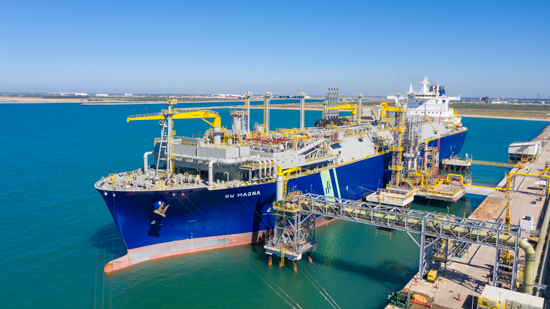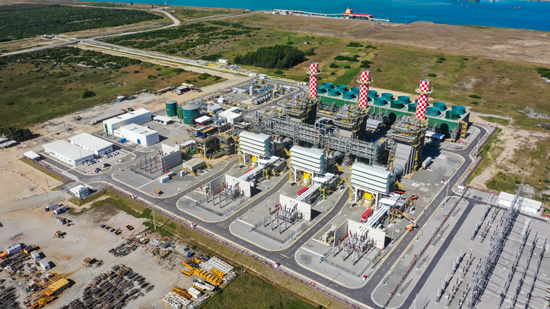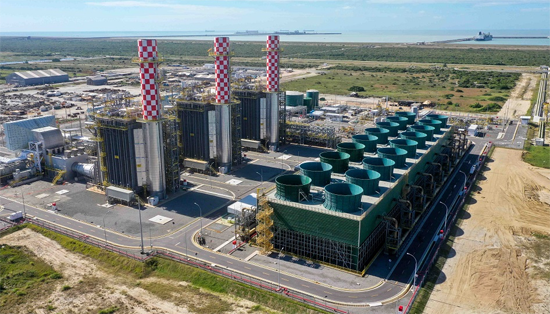GNA I Enters Commercial Operation
Brazil, September 15, 2021 - Phase I of Gás Natural Açu (GNA) Gas-fired Power Plant received authorization from the Brazilian Electricity Regulatory Agency (Aneel) to enter commercial operation on September 16. It marks a new milestone in the endeavor of CPIH to contribute to the Belt and Road Initiative and to realize its own “World-class Strategy 2035”. With GNA I entering commercial operation, CPIH’s controllable capacity in Brazil reached 2.21 GW, with a more balanced and risk-resilient portfolio in hydro, gas and wind assets.

The GNA project is located at Porto do Açu, Rio de Janeiro of Brazil. It includes an LNG-to-power thermoelectric plant, a Liquefied Natural Gas (LNG) terminal, where an FSRU, a floating vessel with capacity to store and regasify up to 21 million m3/day, is moored, as well as a substation and a transmission line of 48 km. The total planned capacity of GNA is 6.4 GW, which will be completed in 4 phases. The project is jointly developed by CPIH, Siemens Energy, BP and Prumo Logistics, a Brazil-based company controlled by EIG. CPIH is the second largest shareholder with 33% equity.

With USD 1 billion of investment and 1,338 MW of installed capacity, GNA I will be able to supply energy for 6 million households. The construction of GNA I created a total of 12,000 jobs locally, providing a boost to local economic and social development. Together with GNA II, which is scheduled to start construction in November 2021 with a planned installed capacity of 1,681 MW, the two combined cycle gas turbine (CCGT) power plants will form the largest LNG-to-power complex in Latin America, able to meet the energy needs of 14 million households. As a reliable and dispatchable power source, GNA provides a solution to the seasonal and intermittent power supply problems troubling large-scale renewable energy development in Brazil. It will contribute significantly to facilitating Brazil’s energy transition, stabilizing the central concentrated load and achieving clean development of the energy sector. Speaking of the significance of this project, CEO of GNA, Bernardo Perseke, said, “We went into operation at a crucial moment for the country, bringing reliable energy to the system, from LNG, a cleaner fuel and considered a catalyst for the global energy transition.”

In November 2019, under the witness of President Xi Jinping and President Bolsonaro, the signing of the Memorandum of Understanding on the project was announced during the BRICS Summit. Carrying forward the results of the summit and the consensus on clean energy development between China and Brazil, CPIH actively advanced the GNA project with the principle of extensive consultation, joint contribution and shared benefits. The cooperation agreement was signed in August 2020, equity transfer was completed early this year, and now Phase I has successfully entered commercial operation. Through the GNA project, CPIH has conducted in-depth cooperation with world-class energy giants and established a cooperative relationship featuring mutual trust and benefit. The GNA project has become an exemplar of how big companies from China, UK, Germany and the US can work with each other in major energy projects in Latin America, and in other Belt and Road countries and regions.
Since entering the Brazilian market in 2016, CPIH has been committed to providing clean power in the country, and contributing to local technical training, children’s education and ecological research through a variety of ways such as sustainable community funds. Such efforts have won CPIH wide-spread recognition and praises. Going forward, under the guidance of “World-class Strategy 2035”, CPIH will continue to work with partners on the remaining three phases of GNA, and vigorously develop clean energy by tapping into Brazil’s rich wind, solar and hydro resources, so as to facilitate the clean energy transition of the country.
Up till now, CPIH’s installed capacity overseas has reached 6.25 GW, among which clean energy accounts for 71%. CPIH’s overseas assets are distributed in Brazil, Pakistan, Mexico, Vietnam, Australia, Chile, Kazakhstan, Germany, etc.
News Center
- Postpone Notice of Competitive Negotiation Procurement Announcement of Romania Melon PV Pr
- Postpone Notice of Competitive Negotiation Procurement Announcement of Romania Melon PV Pr
- Successful Bidder Announcement of Asset Appraisal Services for 4 WPPs in Kazakhstan
- Clarification Notice of Competitive Negotiation Procurement Announcement of Romania Melon